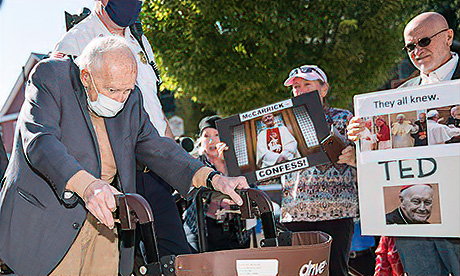A day of reckoning for a once-powerful prince of the Roman Catholic Church had finally come.
Frail and 91, former cardinal Theodore McCarrick was arraigned last week on charges that he sexually assaulted a 16-year-old boy at Wellesley College in the 1970s.
As startling and historic as that event may be, it’s years too late for those he’s accused of having abused — and for a church that still struggles to put the clergy sex abuse scandal behind it.
It probably never will, at least under the current generation of church leaders — not until there are no more victims, and no more clerics to hold accountable.
“The Catholic Church has run out of rugs to sweep things under,” said Jack Connors, a prominent Catholic and business leader who played a major role in calling out church leaders — specifically the late Cardinal Bernard Law — when the Globe Spotlight team first broke news of a massive cover-up of clergy sex abuse some 20 years ago.
While the church under Pope Francis has tried to address the scandal, the underlying problem, said Connors, persists: “There are still too many people around in power that created their own set of rules.”
McCarrick, a former archbishop of Washington, D.C., entered three not-guilty pleas.
As reported by the Globe, the accuser told investigators that McCarrick was a family friend who began molesting him when he was a boy.
On June 8, 1974, the victim, then 16, said he was at his brother’s wedding reception when McCarrick led him into a small room, closed the blinds, and fondled his genitals while “saying prayers to make me feel holy.”
The victim also told investigators about later incidents of the alleged abuse.
Several other men have also filed civil lawsuits in New York and New Jersey against McCarrick. In 2018, the Vatican removed McCarrick from public ministry, citing credible allegations that he sexually abused an altar boy in the 1970s in New York.
With McCarrick’s arraignment, “there’s a new face of accountability,” said Anne Barrett Doyle, co-director of BishopAccountability.org, a group that tracks allegations against priests.
But that new accountability, she said, “is mostly coming from outside the church. Prosecutors are more willing to bring charges. Legislators are more willing to pass laws to empower victims. The news media are more willing to talk about predatory behaviour.”
The church itself has taken “small steps forward,” she said, such as setting up an investigative procedure that’s controlled by the hierarchy.
That set-up probably explains why McCarrick is the only US bishop to have lost his clerical status, although she said 45 others have been publicly accused of sexual abuse.
“McCarrick by no means represents a new willingness by the church to be severe.
He is an outlier,” said Barrett Doyle.
While he now looks helpless, no one should forget the allegations describe “an insatiable predator,” she said. Continue reading
Additional readingNews category: Analysis and Comment.




